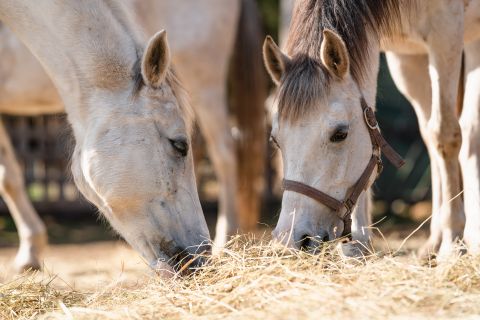
Changing your horse’s feed routine can be a necessary step of responsible pet ownership for various reasons, such as addressing nutritional deficiencies, promoting weight management, or accommodating dietary restrictions. However, abrupt changes can cause digestive upset and stress for your equine companion. To ensure a smooth transition to a new horse feed routine without compromising their health or happiness, follow these tips:
1. Gradual Introduction
- Start Slow: Begin by gradually replacing a small portion of your horse’s current feed with the new feed. Replace no more than 25 percent of their current feed with the new product initially.
- Increase Gradually: Over the next several days, gradually increase the amount of new feed while decreasing the old feed. This allows your horse’s digestive system to adjust to the new nutrients.
2. Monitor Your Horse’s Health
- Watch for Changes: Keep a close eye on your horse’s behavior, appetite, and manure during the transition, as this could signal negative digestive health.
- Consult a Vet: If you notice any signs of discomfort, such as colic, diarrhea, or decreased energy levels, consult your veterinarian immediately.
3. Consider Nutritional Needs
- Consult a Nutritionist: A qualified equine nutritionist can help you determine the optimal balance of nutrients for your horse’s specific needs by considering factors such as age, breed, workload, and health conditions.
- Supplement Wisely: If necessary, introduce supplements gradually to achieve a balanced diet with the necessary nutrients and minerals and to avoid digestive upset.
4. Manage Stress
- Maintain a Calm Environment: Keep your horse’s environment as calm and stress-free as possible during the transition.
- Consistent Schedule: Maintain a consistent horse feeding routine to minimize stress and help your horse feel secure.
5. Address Dental Issues
- Regular Dental Care: Ensure your horse’s teeth are in good condition. Dental problems can interfere with chewing and digestion, making it difficult to transition to a new feed. Consider chopped hay for horses if dental problems are an issue.
6. Avoid Overfeeding
- Monitor Intake: Be mindful of how much your horse is eating. Overfeeding can lead to obesity and other health problems, such as metabolic syndrome, laminitis, or founder.
- Adjust Portions: Gradually adjust the amount of feed as needed to maintain a healthy weight for their breed and age.
7. Consider Feeding Strategies
- Small, Frequent Meals: For horses with sensitive stomachs or metabolic issues, consider giving them smaller, more frequent meals throughout the day.
- Soaking Feed: Soaking your horse’s feed can help improve digestibility and reduce the risk of digestive upset.
8. Be Patient
- Allow Time: Transitioning your horse to a new feed routine may take several weeks. Be patient and allow your horse’s body to adjust.
By following these tips, you can ensure a smooth and stress-free experience when transitioning your horse to a new feed routine. Remember to consult with your veterinarian or an equine nutritionist for personalized advice based on your horse’s specific needs.




